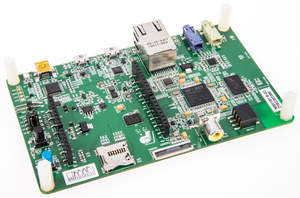RS Components (RS), the trading brand of Electrocomponents plc (LSE: ECM), the global distributor for engineers, today announced availability of the new STMicroelectronics STM32F7 MCU series, the world's first microcontroller that features the 32-bit ARM® Cortex®-M7 processor and is now available in volume production. The Cortex-M7 is the latest and highest performance processor core in the Cortex-M family and has been designed for use in advanced consumer, industrial, medical and Internet of Things (IoT) devices.
 RS Components announces availability of new STMicroelectronics STM32F7 microcontroller -- world's first MCU in volume production to feature high-performance ARM Cortex-M7 processor core
RS Components announces availability of new STMicroelectronics STM32F7 microcontroller -- world's first MCU in volume production to feature high-performance ARM Cortex-M7 processor core
The new STM32F7 MCU is the highest performance member of ST's STM32 MCU family and combines the Cortex-M7 core with advanced peripherals to deliver unrivalled opportunities to enhance application performance, add new functions, extend battery life and ensure security, as well as minimising use of external components to save cost and size. The STM32 family from ST is well known across the industry for its power efficiency and pin-, peripheral- and software-compatibility across more than 500 different devices, as well as offering the extensive STM32 development ecosystem.
Maximising the advantages of the ARM Cortex-M7 over earlier cores such as the Cortex-M4, the STM32F7 MCU series has approximately twice the DSP capability, making the MCUs ideal for applications requiring high-speed or multi-channel audio, video, wireless, motion recognition or motor control. Also, taking advantage of ST's advanced ART Accelerator™ graphics engine and the L1 on-chip cache of the Cortex-M7, the STM32F7 MCUs deliver the maximum theoretical performance of the Cortex-M7 and offer 1082 CoreMark/462 DMIPS at 216MHz, whether code is executed from either embedded Flash or external memory. The devices deliver high processing efficiency of 6 CoreMark/mW at 1.8V and also excellent low-power performance with typical current consumption of only 100µA in Stop mode or as low as 1.7µA in Standby mode.
Offering a highly flexible architecture, the series features an AXI and multi-AHB bus matrix for the interconnection of the core, peripherals and memories. The selection of advanced peripherals includes features such as a dedicated power rail for the USB OTG, which enables USB connectivity to continue operating while the rest of the chip is powered at 1.8V to save power. Dual clock support on most of the peripherals also allows CPU speed to be reduced to minimise power consumption, while keeping the clock frequency unchanged on communication peripherals.
Two STM32F7 product lines are available -- STM32F745 and STM32F746 -- all of which feature the Cortex-M7 core with floating-point unit and DSP extensions, running at up to 216MHz. The STM32F745 MCU has up to 1MB of on-chip Flash memory, as well as 320KB RAM, Ethernet, QSPI and camera interfaces, and a Flexible Memory Controller (FMC). The STM32F746MCUs extend this functionality with an on-chip TFT-LCD controller. The STM32F7 MCUs are available in a range of packages, including: 14x14mm LQFP100; 28x28mm LQFP208; 10x10mm 0.65mm-pitch UFBGA176; 13x13mm 0.8mm-pitch TFBGA216; and 5.9x4.6mm WLCSP143.
Also available from RS is the STM32F7 Discovery kit, which delivers high levels of flexibility and enables developers to fine-tune hardware and software at any stage of development. Developers can also benefit from the associated STM32CubeF7 firmware and the ability to re-use all STM32F4 software assets, due to the backward compatible instruction set with the Cortex-M4. In addition, unlimited development expansion capability is provided via the board's compatibility with Arduino Uno shields.
The STM32F7 series of MCUs and STM32F7 Discovery kit are now available to order in the EMEA and Asia Pacific regions from RS.